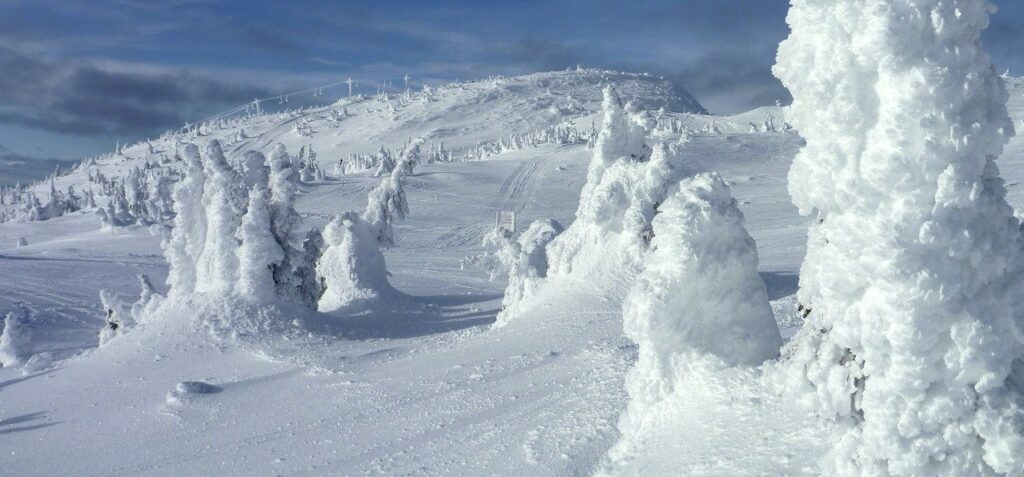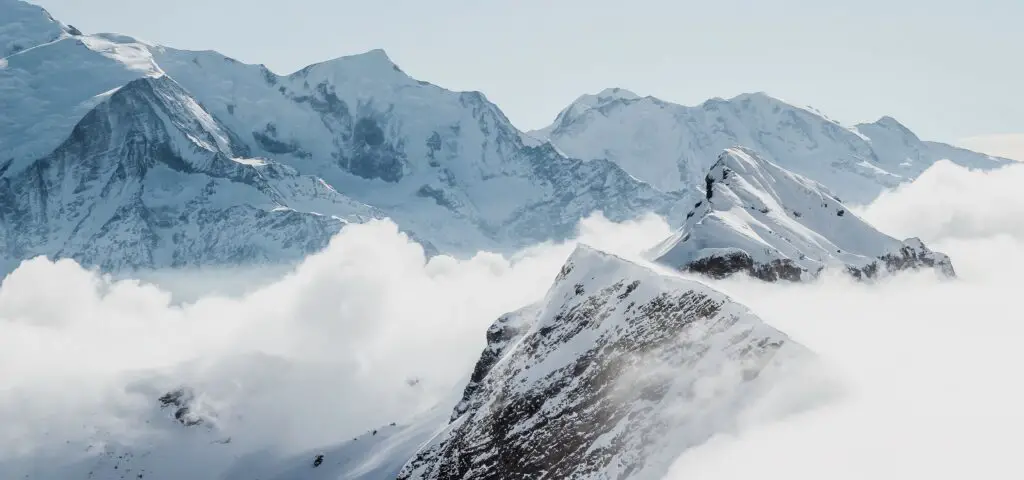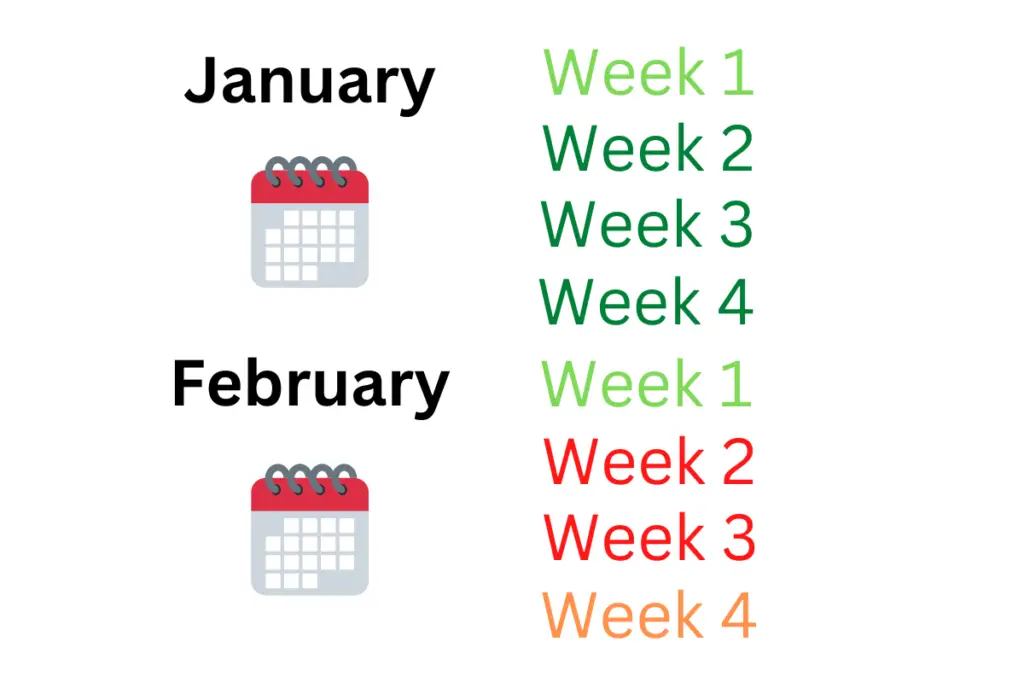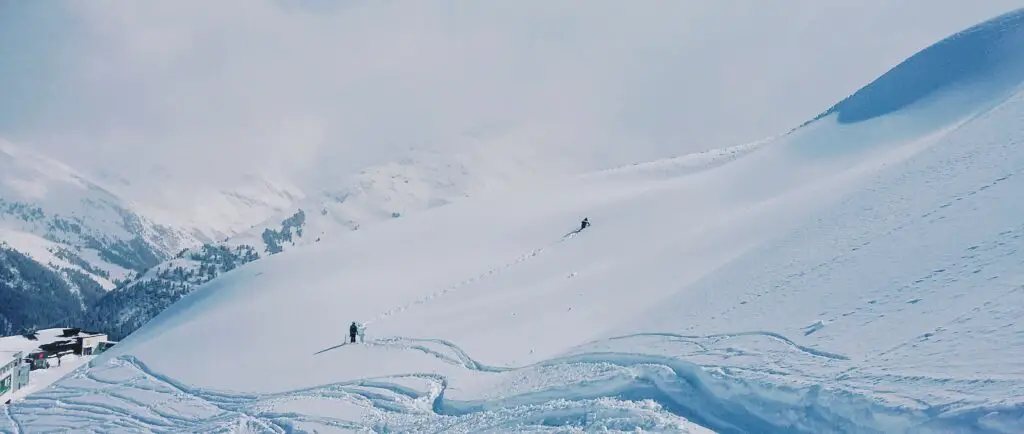January and February are two of the best months of the year to go skiing in Europe, North America and Japan, but which month is the best? In this article I’ll compare the snow, crowds, cost and climate in each month across the globe so you can decide which month is best for you.
January vs February for Skiing
February offers the best snow quality for skiing in Europe, North America and Japan. However, due to the school holidays, February is much more crowded and expensive. January is a great month to go skiing because it is quiet, cheap and the snow quality is still excellent.
| Consideration | Best Month |
| Best Snow Quality | February |
| Least Crowded | January |
| Cheapest Holiday | January |

Which Month has the Best Snow?
On average, ski resorts receive 10% more snow in January compared to February. Some countries such as Austria, and some regions of Canada which receive considerably more snow in January compared to February.
However, there are some exceptions. For example, Japan typically receives more snow in February compared to January, and also some resorts in Europe namely Italy and Switzerland.
Check out the table below to see the average snowfall in January and February for the top resorts in North America, Europe and Japan.
| Resort | Average Snowfall January | Average Snowfall February |
| Vail, USA | 50″ | 49″ |
| Park City, USA | 57″ | 55″ |
| Whistler Blackcomb, Canada | 83″ | 46″ |
| Lake Louise, Canada | 35″ | 35″ |
| Courchevel, France | 37″ | 41″ |
| Val d’Isere, France | 45″ | 32″ |
| St. Anton, Austria | 53″ | 36″ |
| Solden, Austria | 53″ | 28″ |
| Zermatt, Switzerland | 37″ | 25″ |
| St. Moritz, Switzerland | 29″ | 36″ |
| Cortina d’Ampezzo, Italy | 20″ | 36″ |
| Cervinia, Italy | 36″ | 27″ |
| Niseko, Japan | 128″ | 133″ |
| Rusutsu, Japan | 40″ | 60″ |
The snow depth is greater in pretty much every ski resort in Europe, North America and Japan in February compared to January. On average, the snow is 20-25% deeper in February.
The snow depth in many resorts increases considerably over the course of January, so if you’re looking for the deepest snow go for either late January, or any time throughout February.
Check out the table below to see the average snow depth in January and February for the top resorts in North America, Europe and Japan.
| Resort | Average Snow Depth January | Average Snow Depth February |
| Vail, USA | 43″ | 55″ |
| Park City, USA | 46″ | 61″ |
| Whistler Blackcomb, Canada | 66″ | 82″ |
| Lake Louise, Canada | 51″ | 58″ |
| Courchevel, France | 46″ | 55″ |
| Val d’Isere, France | 78″ | 70″ |
| St. Anton, Austria | 51″ | 68″ |
| Solden, Austria | 57″ | 69″ |
| Zermatt, Switzerland | 42″ | 54″ |
| St. Moritz, Switzerland | 31″ | 40″ |
| Cortina d’Ampezzo, Italy | 25″ | 35″ |
| Cervinia, Italy | 49″ | 64″ |
| Niseko, Japan | 91″ | 114″ |
| Rusutsu, Japan | 69″ | 79″ |
Overall Snow Conditions
Typically, the snow conditions are better in February compared to January. January has more snowfall, however the snow depth has still not built up as much.
In February, there is still a very good level of snowfall in most resorts and the base will be much deeper. The temperature is slightly higher in North America (similar in Europe and Japan) but not too high so that it negatively affects the conditions.

What is the Average Temperature?
- In the USA is is usually 5-6°F (4-5°C) colder in January compared to February
- In Canada is is typically 6-8°F (5-6°C) colder in January compared to February
- In Europe and Japan is it usually about 2-3°F (1-2°C) warmer in January compared to February
Worried about January being too cold? Check out this article on skiing in January and how to stay warm.
Check out the table below comparing the average temperatures in January and February in major ski resorts around the world.
Fahrenheit
| Ski Resort | Average Temperature January | Average Temperature February |
| Vail, USA | 28°F / 5°F | 34°F / 9°F |
| Lake Louise, Canada | 21°F / -4°F | 12°F / 1°F |
| Courchevel, France | 32°F / 16°F | 36°F / 16°F |
| St. Anton, Austria | 36°F / 25°F | 37°F / 27°F |
| Zermatt, Switzerland | 34°F / 25°F | 34°F / 23°F |
| Cortina d’Ampezzo, Italy | 32°F / 18°F | 37°F / 19°F |
| Niseko, Japan | 28°F / 12°F | 30°F / 12°F |
Celsius
| Ski Resort | Average Temperature January | Average Temperature February |
| Vail, USA | -2°C / -15°C | 1°C / -13°C |
| Lake Louise, Canada | -6°C / -20°C | -11°C / -17°C |
| Courchevel, France | 0°C / -9°C | 2°C / -9°C |
| St. Anton, Austria | 2°C / -4°C | 3°C / -3°C |
| Zermatt, Switzerland | 1°C / -4°C | 1°C / -5°C |
| Cortina d’Ampezzo, Italy | 0°C / -8°C | 3°C / -7°C |
| Niseko, Japan | -2°C / -11°C | -1°C / -11°C |
Which Month is the Least Crowded?
January is a less crowded month to go skiing compared to February. This applies to all ski resorts including those in the USA, Canada, Europe and Japan.
In January, many people have returned to work after the holidays and are less likely to travel after an expensive season. The kids are also back at school which takes a lot of pressure off the slopes and leads to less crowds.
The first week of January is usually busier than the final three as some people take an extended holiday break through the new year. In the USA, Martin Luther King Jr. Holiday weekend will also draw more crowds to the slopes which is in mid-January, so avoid this week if you’re worried about crowds.
The start of February is usually relatively quiet and similar compared to January, however the middle and end of the month are much busier as this coincides with the school holidays in many countries around the world. Typically, only the first week in February is less crowded and the other three can be very busy.


Which Month is the Cheapest?
Booking a ski holiday is cheaper in January compared to February. This is because there’s less demand as the snow conditions aren’t quite as good, and the kids are at school which means you’ll get cheaper flights, accommodation and sometimes even lift tickets in January.
Flights
On average, flights are more expensive in February during the school holidays compared to January.
The price of flights varies massively not only depending on when the flight is booked for, but also when you book it. Typically, mid-week is the best time to both travel and book flights to get the cheapest prices. Also try and book during the working day if you can, as prices often increase in the evening.
Accommodation
In Europe and North America, the average cost of accommodation is about 15-20% cheaper in January compared to February. In Japan, the price of accommodation is similar during both months.
Cheapest accommodation dates:
- Third and fourth weeks of January
- First week of February
Most expensive accommodation dates:
- Martin Luther King Jr. Day (USA only)
- Second and third weeks of February
It is also important to book early if you plan on going in the school holidays as accommodation can quickly book up.
Here’s a table comparing the average price of accommodation per night in January and February in the world’s top ski resorts.
| Ski Resort | Average Cost January | Average Cost February |
| Vail, USA | $500 | $700 |
| Whistler Blackcomb, Canada | $600 | $620 |
| Courchevel, France | 380€ | 450€ |
| St. Anton, Austria | 300€ | 350€ |
| Zermatt, Switzerland | 350 CHF | 375 CHF |
| Cortina d’Ampezzo, Italy | 260€ | 310€ |
| Niseko, Japan | ¥9000 | ¥9000 |
Lift Tickets
Some ski resorts increase the price of lift tickets during the school holidays as this considered a peak time. The price increase is typically around 5-10%.
However, not all ski resorts do this so it’s worth comparing resorts in the region you want to visit to see if the price of tickets is dramatically different between dates as this can have a huge impact on the overall cost of the skiing holiday.
Here’s a table comparing the average price of adult lift tickets in January and during peak times in February in the world’s top ski resorts.
| Ski Resort | Average Cost January | Average Cost February |
| Vail, USA | $208 | $208 |
| Whistler Blackcomb, Canada | $167 | $186 |
| Courchevel, France | 55€ | 55€ |
| St. Anton, Austria | 67€ | 67€ |
| Zermatt, Switzerland | 167 CHF | 167 CHF |
| Cortina d’Ampezzo, Italy | 62€ | 69€ |
| Niseko, Japan | ¥6,600 | ¥6,600 |
